
Did you know that Nozbe can help you build a new habit? Let’s take learning a foreign language as an example. Who wouldn’t like to speak an extra one, huh? Say… French…
Before you start
Scientific researches have found certain mechanisms that rule the process of creating a habit. Based on that, we can formulate a couple of tips that will help you take off.
-
Set a big goal - have your vision of what you want to achieve and why. Talk to yourself for a while and make sure that learning a new language is something you really want and need.
-
Make it so easy you can’t say no. — Leo Babauta - start approaching your big goal with tiny steps. Try setting the tasks easy enough so that you can get it done without motivation (that is kind of moody and differs depending on a day, weather and other circumstances.)
-
Building sticky habits is a lot easier if you make use of the routines you already have rather than try to fight or modify them. It’s good to build your plan around triggers that will let you know that it’s time to work on your habit, e.g.: after I get up and have a glass of water I learn French.
-
When you fail, get back on track as quickly as possible. Don’t worry! Missing your habit once or twice, no matter at what stage it occurs, has no serious impact on your long-term progress. Instead of trying to be perfect, be good and compassionate to yourself. You’re doing a great job!
OK. Once you know the rules, let’s get to work :)
Your vision
As mentioned above, you need to kick off by creating a vision and planning your big goal.
Think of what would change in your life once you can communicate in French. How would it improve your position on a job market and increase the chances of getting a better job? Would it be useful in terms of your dream journey to Africa planned for next year? Do you like French at all? The way it sounds? What about French culture? Music? Food? Did you like French lessons you had for a year when in high school?
Once you’re done and you’re sure learning French is a really important and cool thing to you, set your big goal. It might be for instance being able to pass an on-line test for intermediate French students with min.80% result in 6 months or reading a travel guide in French.
After you have a big goal, think of the milestones - the smaller goals that will let you regularly review your progress.
Study materials and resources
This aspect is beyond my competence :-) Before starting to learn a language you need to choose the method and the resources that will work best for you.
Nozbe setup - goals and milestones
Create a project called “French” in Nozbe.
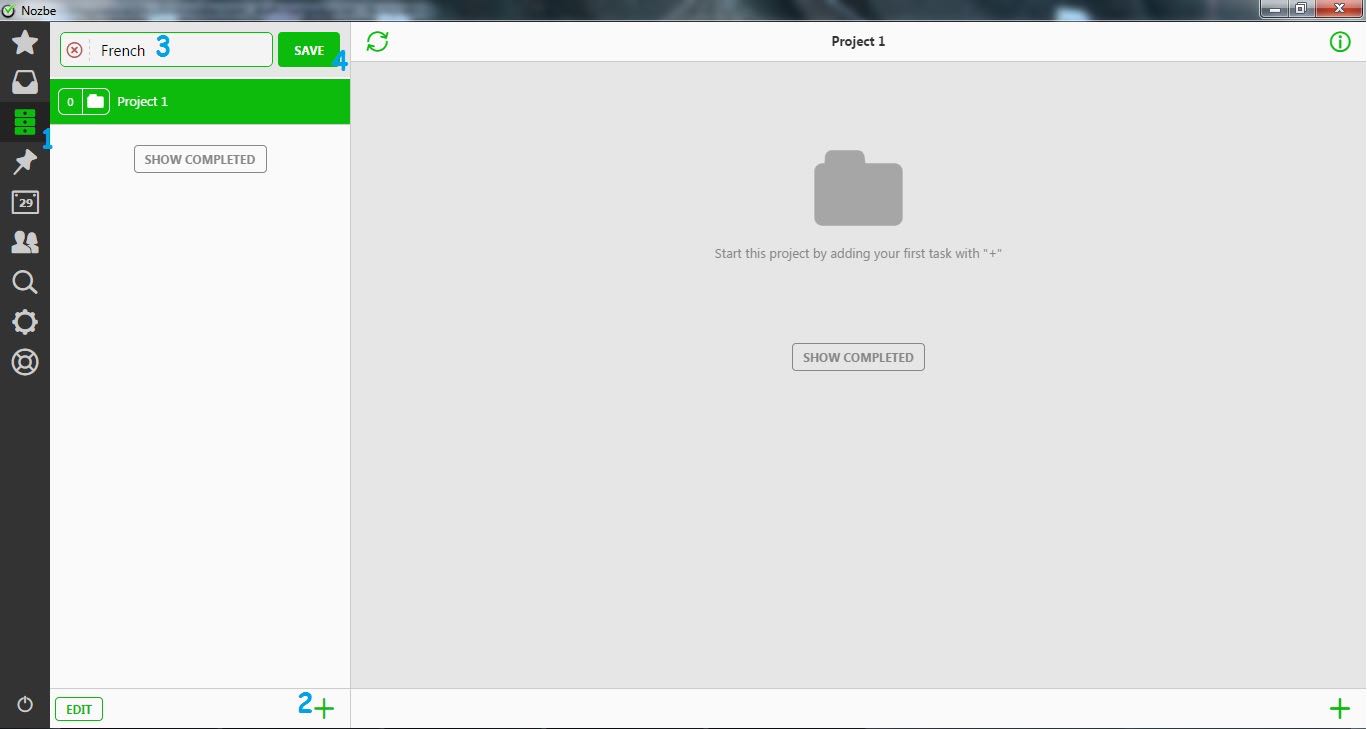
In the project description write about your vision and profits you will have once you complete this mission. Let it be a motivation and a power kick for you :)
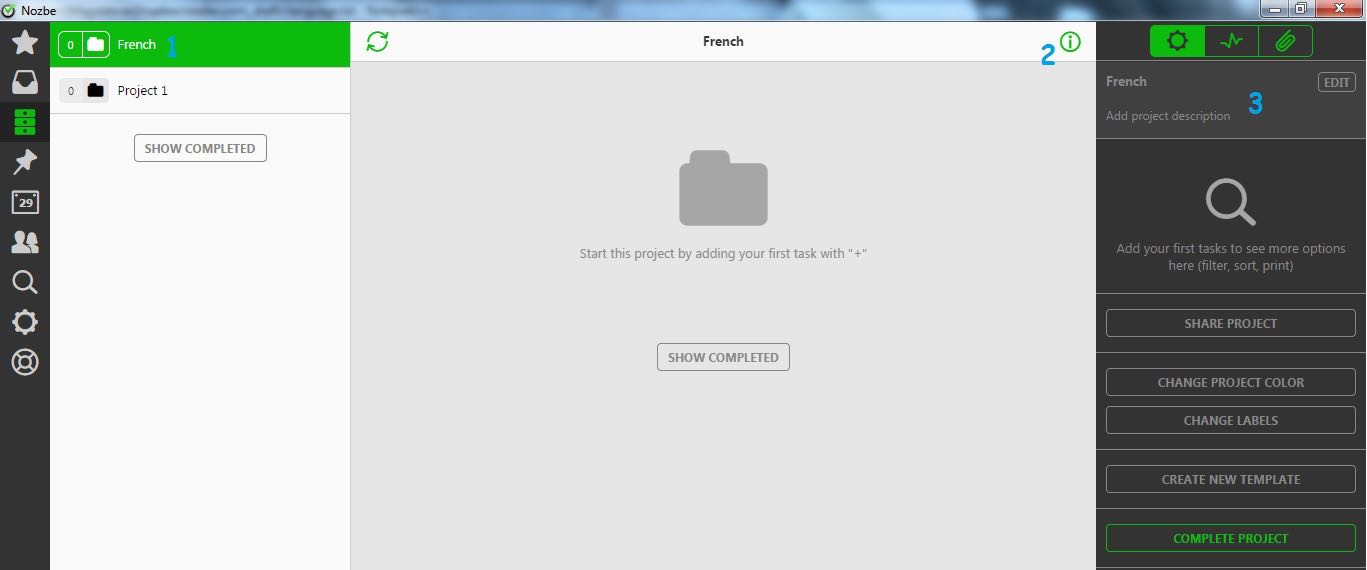
Create a new task called “Success”. Write something great and rewarding in a comment - make it really cool as it will be your reward when you are done :) Set the “Repeat” parameter “every half a year” and mark it as completed. If you don’t share this project with anyone the task will be automatically delgated to you. If you share it with someone, remember to change the Responsibility to “You”. It will reappear on your priority list in 6 months. For now, it is going to be invisible in order not to clutter the list.
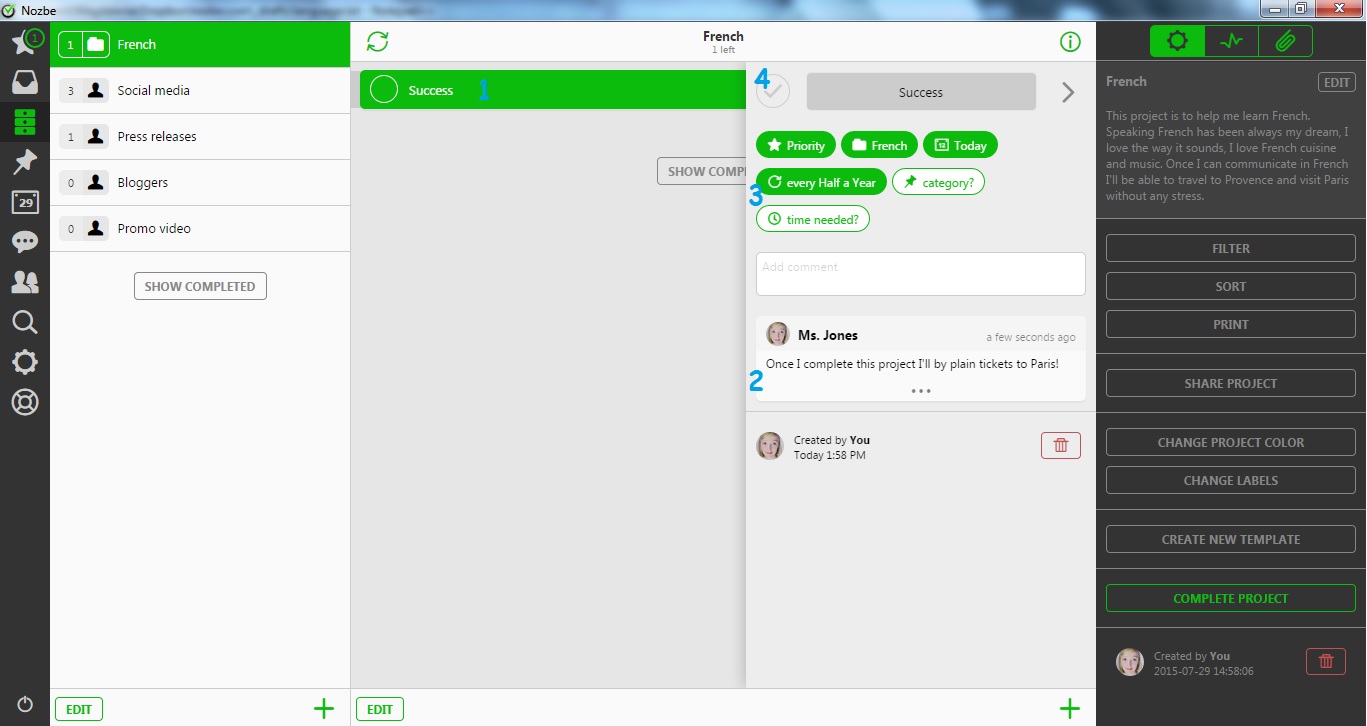
Now, set your first milestone. Create a “Milestone” or “Progress review” task in “French” project in Nozbe. It can be something like: Get 90% score in online test or read a given article in French.
You can also make it a list of topics of conversations you can have in French.
Now, set the “Date” parameter to a day in one month from now, delegate the task to yourself, set the “Repeat” parameter to every 4 weeks and tick the task as done. This way it will show up in your priority list in Nozbe in a month and you will be able to run your first progress review.
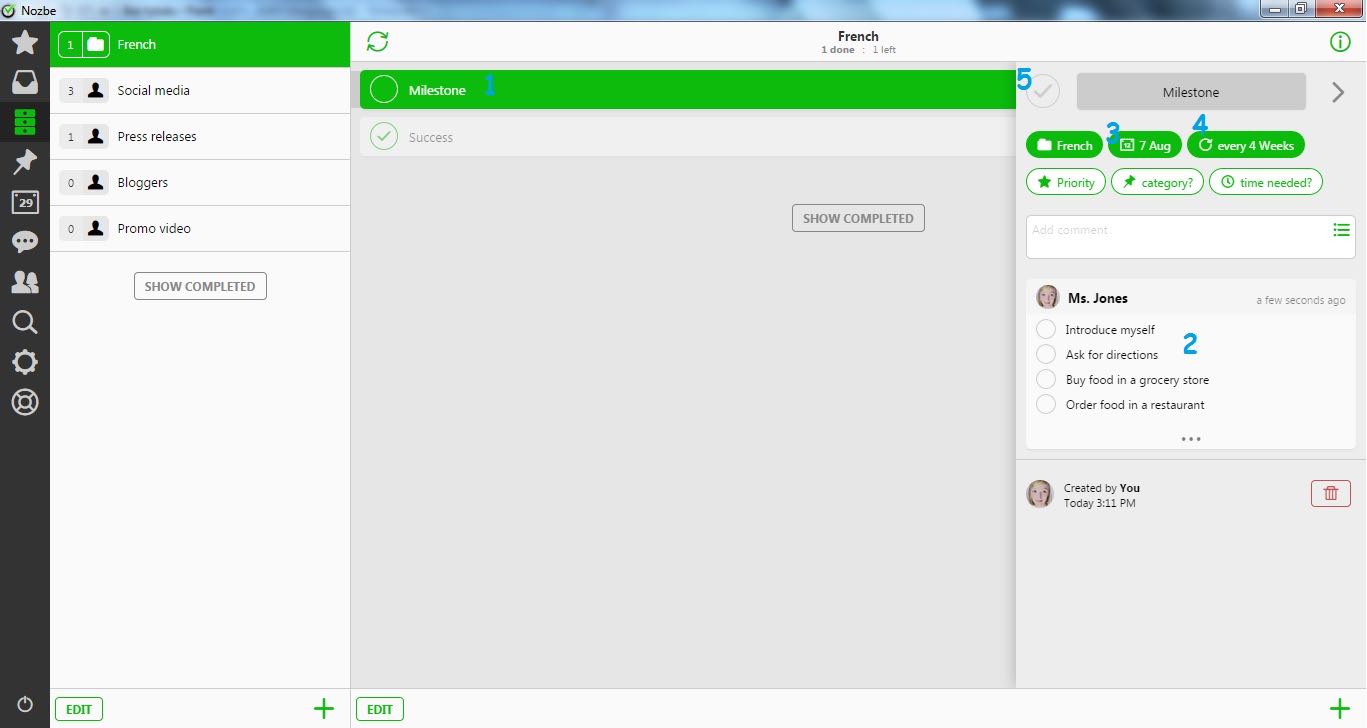
Everyday tasks
As you want to start small, begin with a 15-minute-session every day and see how it goes. Make the lessons longer when you feel like, but let 15 minutes be a minimum. You will make the lessons longer in some time - when you’re ready.
Create a new task (1,2,3) “Lesson 1” in your “French” project in Nozbe. Write there the stuff you want to learn within the first day (4). Delegate the task to yourself (if you share the project with someone), set the “Date” parameter to, let’s say, Monday, 10 August at 7:00am (5) and set “Time needed” to 15 minutes (6). Also use a green star to make the task your priority (7).
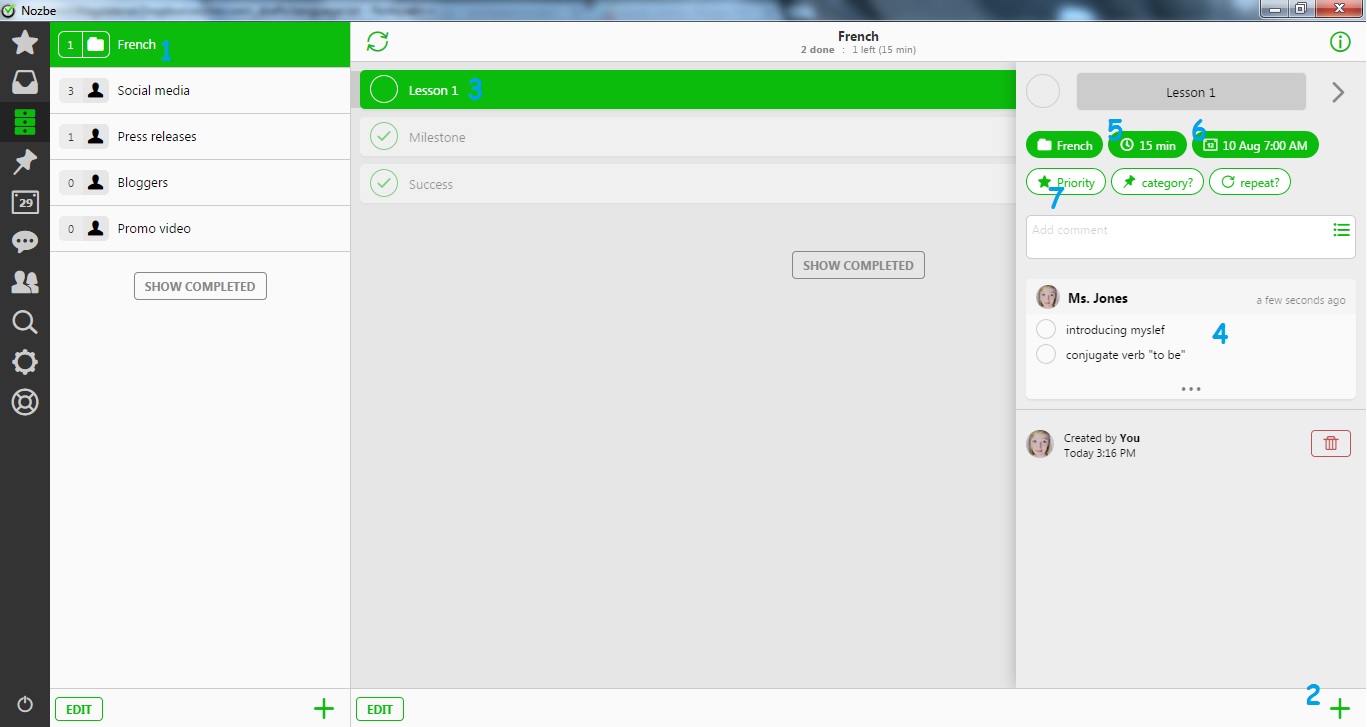
Enable the notifications in the Settings section in Nozbe. Make sure the notifications are “on” on your smartphone too. As the task is set to 7:00am, you will get a notification from Nozbe 30 minutes before (that’s a standard in Nozbe at the moment) meaning 6:30.
I recommend setting your alarm clock to 6:29am :-) so that the notification from Nozbe at 6:30 doesn’t let you snooze any longer :-)
Then, get up, have a glass of water and sit down to learn French :-) Work as long as you wish but not less that 15 minutes. At the end of the lesson, mark Lesson 1 as done and prepare the study topics for tomorrow. Save them in a new task called “Lesson 2” with the parameters fixed as in case of “Lesson 1” but with the “Date” set to a following date also at 7:00am.
Alternatively, instead of marking your lessons-tasks as done every time, you might just change “Responsibility” parameter from “You” to “Anyone”, delete the date and keep them on your tasks list to have them in front of your eyes every day. It might be a nice thing to see a whole bunch of topics you have already learned when getting to work in the morning.
No matter which method you choose, repeat the procedure every day. Add new tasks: “Lesson X” at the end of every session to have everything ready when you take off at 6:30am. To make the learning process more neat and structured you might want to have certain categories of lessons:
- Grammar - Tuesdays, Thursdays
- Vocabulary - Monday, Wednesday
- Skype conversation with a native speaker - Fridays.
You can add “Grammar,” “Vocabulary” and “Conversation” as categories in Nozbe and then be able to filter the lessons by these categories when doing a monthly evaluation.
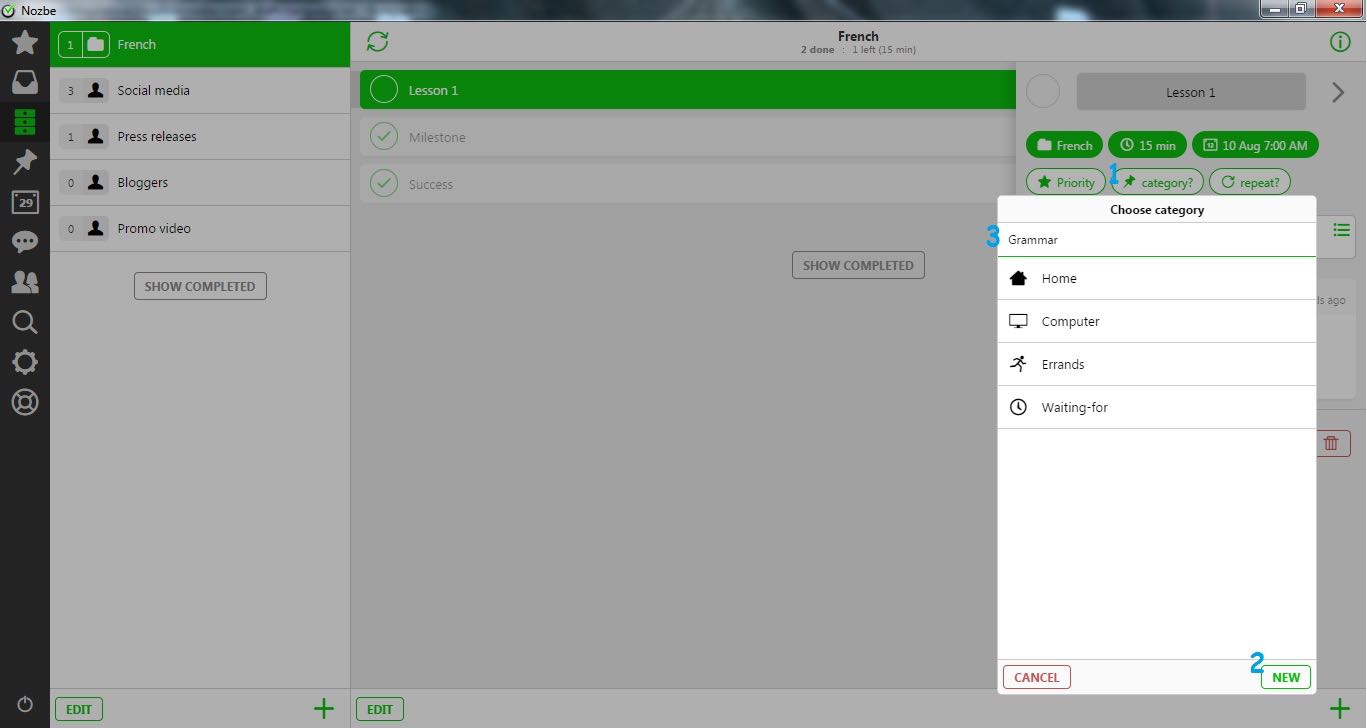
Milestones
You can make amazing progress if you are patient and consistent. Don’t go for too big goals, don’t spend too much time studying, don’t choose to difficult grammar issues. The time you spend “with” the language is already a way to learn it.
If you skip your lesson one morning - don’t stress out. It’s OK. Just make sure to continue the next day. All-or-nothing mentality is no good.
After one month - your recurring “Milestone” task will appear on your priority list. You’re going to see if you haven’t set the bar too high (or too low :-)) Apart from testing yourself, you can make notes regarding what you have done in the last month and think of what didn’t work. Ask yourself what prevented your habit from happening. If there was something that got in your way? What were daily emergencies that pulled you off course? How can you plan to work around these problems? Amend and optimize your strategy and recommence another monthly cycle.
Once ready, you should write down another milestone in your “Milestone” task - a new comment containing a goal or a list of topics you will be ably to discuss by the end of this month. Mark the task as done and it will re-appear next month :)
The final destination
After six months and completing six milestones you should be really close to your final - big goal that you set at the beginning. Try to do the test you thought you would be able to complete with the 80% result or read the travel guide in French. At this time, your “Success” task will appear on your tasks list. Who knows - maybe you wrote something really nice there or promised yourself a great reward? :-)



